|
I've been invited, by fellow writer Adam M Booth, to take part in the 'my writing process blog tour'. This is a great little project where writers nominate each other to respond to four question about their current projects and process. It's a great way for readers and writers to get into the mind of their favourite novelists, glean some tips on the writing process and find out what people are currently writing. 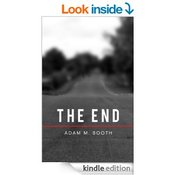 So firstly, huge thanks to Adam for inviting me. Go check out his answers from last week and while your there take a look at his novella 'The End'. It's an incredibly gripping and dark zombie horror, written from the zombie's perspective. And its only 77p for kindle. You'd be stupid not to grab it. (Link right). Next week you'll be able to read the responses from Adrian P Fayter, Phil Lickley and N.E.David - So make sure you take a look at there posts next week. Who knows you might just find the big seller of the future, your favourite book of the year or grab a tip that helps you complete your next masterpiece - More on them at the end of my blog. So here goes... What Are You Currently Working On?At the moment I am working on my second novel. Unlike Life Without the title is giving me hell and is not surfacing at the moment, so for now I'll refer to it as Death of the Artist (this may change). It's a story about a young girl, Tillie, who is trying to find the studio of her artistic hero, David Lanzer. David is a successful, but haunted artist. All his works are part of larger series and he is entrenched in his art and his process. (I'm finding this oddly relevant to the interview!? He's not me honest!? :p). Early in the story Tillie finds David's studio and decides to break in, moments later David walks through the door. Now flung together these two obsessive personalities go on a brief, relationship forging, journey. I won't say too much more but it certainly doesn't have Life Without's happy ending. I have also sent off a flurry of short stories to a number of different places recently. One that I am really hoping will pay off is a new entry to the Rowntree's Park, Words From a Bench project. I've been published by the project twice now and this round the successful pieces will go live in a a park in Iceland as well as in York. Very cool! You can read my November and February entries at the wordpress site. How Does Your Work Differ From Others Of Its Genre?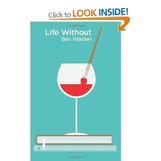 I always try to put a little twist on the stories I write to make them individual. Life Without was slightly different to other in the romance genre because it was written from a male perspective. I get a lot of comments about this balance, which readers seem to really notice. I didn't really aim to carry a message through the book but I suppose it balances a genre where males are usually strong characters and females are portrayed as being damaged in some way and world apart from other characters. Death of the Artist (as I'll call it for now) is actually a totally different genre. It is effectively a thriller but it masquerades as a romance for a majority of the story. I think this is what will make it unique when it's finished and (hopefully) make it an interesting and original piece. Why Do You Write What You Do?I write a lot of different thing; different genres and also different formats. I started as a scriptwriter and still enjoy writing for screen, stage and radio, as well as writing short stories and novels. I also write songs, though that's more of a hobby. I have always said that I love storytelling; I find it fascinating that people construct their world through narratives. We tell each other jokes, put a spin on our experience of the day and more and more we constantly convert our lives into stories. New media has a big influence on this and so many of us now create stories through blogs, Facebook posts, tweets, Snapchat pictures, YouTube videos, the list goes on. I write what I do because I have an internal drive to share stories and I feel very privileged when someone takes time away from their lives to immerse themselves in something I have written. It sounds very cliche, but it really is just part of who I am. How Does Your Writing Process Work?I am all about structure and research. I don't think any story can just come about. Stories should be understood; characters have to be thought through and everything written should be pushing towards the goal that is the end of the story. It's a bit like a joke; you might embellish it to bring it to life but every word is forging towards that punch line. Stories for me should have that same sense of direction. 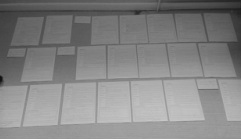 All my scene cards on the floor All my scene cards on the floor When I'm writing I'll firstly try and put my idea into a couple of paragraphs. What I'm trying to do at that point is work out a rough map for the beginning, middle and end of my story. I think it's really important to do this because those steps of a story are ingrained in us as a culture and it's amazing how many new writers get it wrong. So I write a paragraph or two, which aim to introduce the characters. Not just say 'this is David' but to tell us who David is. Is he a brat, a rich but lonely entrepreneur, a salesman who is rubbish at his job. Then that paragraph needs to tell me what they want, what is going to get in the way and what ending I am coming to. With that rough shape in mind I then start to flesh out the characters more. Who they are as a whole; what are their quirks; where do they live; where have they come from? I sometimes do little exercises to get these characters concrete in my mind, like writing down their hopes, fears, relationship with others or reading a newspaper article and trying to workout how they would react to what's been written. Finally, before writing, I'll try to write a scene by scene breakdown of the story. I only generally start writing when I have all of this together and feel like I know the characters and the general journey of the story. Sometimes, if an idea is really fresh in my mind, I might just write. With Life Without it all just seemed to come, so I wrote the first five chapters and then I went back to the planning stages. Those five chapters actually became chapter 1,5,6,9 and 12 once I'd really thought it through. My current book, Death of the Artist, all hinges round the idea of obsession, so I've done a lot of psychological research. I read some of Freud's case studies and I tried to identify elements of a obsessive personality. I've then built this into my characters. For example, David has a whole back story about his upbringing that is purely designed to help me write him and understand what he would do in certain scenarios. I have no intention of putting the back-story in the finished book. Writing in this very structured way isn't for everyone but it really helps me write solid characters, which I'm often complimented for. It also helps me start and finish a book, which is a big challenge. A lot of potential writers out there have a great idea but never finish it. To them I say plan it out, stick to your plan and you'll get there. Once you've got a finished article you can play. Take bits out, add now things in, shift things around. I suppose I find the editing process a lot more fun and creative than the original writing process. Making a start on a blank page is a challenge for everyone. So there you are. That is my writing process blog tour. Please feel free to comment and ask any questions. Its great to talk about process with fellow writers, no matter how long they've been doing it or what level they are at. I love to get involved so give me a shout. Next Monday: Adrian P Fayter, Phil Lickley and N.E.David will take their turn. Take a look. 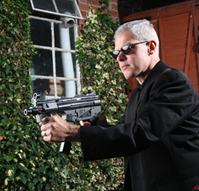 Adrian P Fayter, author of the Larry Di Palma series of crime novels. If you think crime books can't have a sense of humour, prepare to be proved very wrong! 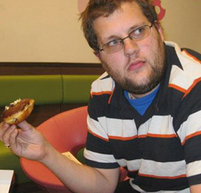 Phil Lickley, is a 28 year old manager at a Students' Union with a passion for music. Phil enjoy all sorts of writing but mainly writes reviews on musicians/music, gigs and theatre productions. He hopes to finish off a novel and some short stories, one day! 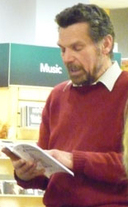 N.E.David, is the pen name of York author Nick David. Nick tried his hand at writing at the age of 21 but like so many things in life, it did not work out first time around. Following the death of his father in 2005, he took it up again and has been successful in having a series of short novellas published both in print and online. Besides being a regular contributor to Literary Festivals and open mics in the North East Region, Nick is also a founder member of York Authors and co-presenter of Book Talk on BBC Radio York. His debut novel, Birds of the Nile, is published by Roundfire.
0 Comments
Here's a thing that interests me a lot as a writer and something that I am wrestling with in the book I'm currently writing.
How do you make interesting, three-dimensional characters using only language? Characters can make any story either perfect or awful. We all have the characters that we love and I'm sure that you've had that moment when you finish a book and actually feel like you'll miss the characters you have been reading about. It's a strange thing because in truth you haven't met anyone. That character does not exist and unlike television or film you can't even bond with the person playing that character. The characters in fiction are just ink on the page. However, language can be used to create characters far more real than some people seem to be and definitely more believable than the cast of Hollyoaks. In my current novel I am writing about an artist who is obsessive and very introverted; he has some real problems and a serious obsession and love for art. I needed to work out how I was going to get this into the language and make this character come alive. After a long planning process I am now three chapters into the book and David, my character, seems to be taking shape. To get David right I felt I had to get inside his psyche, a bit like a method actor would for a role. So for a start I read several of Freud's articles and cases on obsession and started to work out how this obsessive mental state comes about and works. Once I had some notes I could go back to my story concept and start to see how David's motivations and actions maybe inspired by this condition, what may have caused it and how the action could progress in a way that portrayed his obsessive side. (So that I didn't have to say ' David was obsessive'). I wrote David a back story, which I currently have no plan to feature in the novel itself. This gave me a much better idea of the factors that would later influence David's decision in life (in the novel)-I then briefly reminded myself that David wasn't real so I didn't start talking to him in public and continued!?! Of course I worked up a character sheet, as so many books on writing will tell you to do and this was incredibly useful. I listed David's physical appearance; I listed his achievements; his fears; his goals and motivations, along with anything else that seemed interesting. The next things to do was to work up my second character in a similar way. I felt that it was important to interrupt the flow at this point, so that my secondary characters didn't become a secondary in their own 'realness.' Doing the same sort of character sheet as the one I had done for David and working up these characters relationships and reactions to David's character also really helped flesh out David and his world. After reading a book on method acting, I decided that I should try create some scenes to get into the flow of talking like David, so I wrote up an interview. David is an artist, so I figured he would have to deal with an interview at some point in his career. I wrote this interview to allow me to get into David's mind set and soon the answers (to questions I took from a real interview on-line) really started to flow. I would highly recommend this as an exercise for getting yourself into character. If an interview doesn't work why not try reading a paper and trying to work out what response your character would have to the story you've read, or sit somewhere and people watch and try to think about what you see from your characters perspective. At some point you will have to start creating both the scenarios and your characters reaction to them, so if those reactions are already second nature your writing should flow with far less starring into space, walks round the neighbourhood, tidying your desk, or whatever else you do to avoid writing. Let's not forget, characters are everything! |
AuthorBen Warden - Editor of the #SFFiction project and author of 'Life Without', which made the top ten literary fiction e-books on amazon. Categories
All
Blog Archive
January 2020
|


 RSS Feed
RSS Feed
